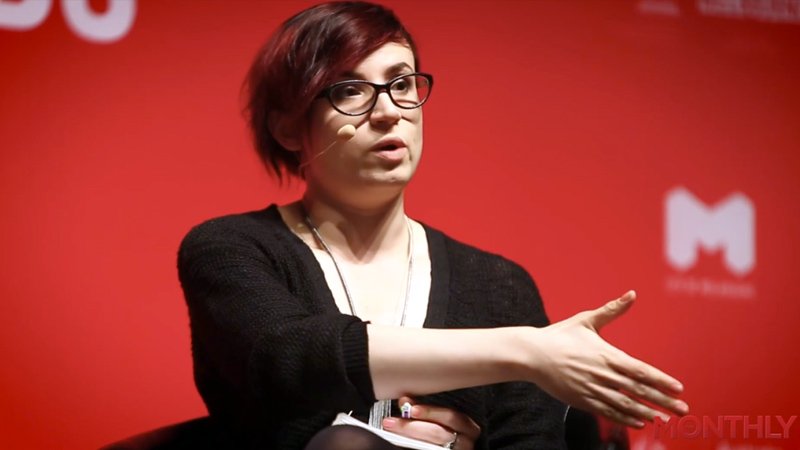Style matters
On the broad-sweep feminism of Laurie Penny

Recent Blogs
Advertisement
From the front page
Laurie Penny is a 28-year-old English feminist, author of four books, and a contributing editor at The New Statesman, which might be called Britain’s centre-left newspaper or its left-of-centre newspaper, depending on how far to the left one is standing. She has also recently completed a year’s study of social movements as a Nieman Fellow at Harvard University, and is at present touring Australia – the Melbourne Writers Festival last weekend, the Brisbane Writers Festival and Sydney’s Festival of Dangerous Ideas next.
In Britain, at least, Penny is something of a left-wing celebrity. I could call this an uneasy collision of categories, but it is more truthful and more fair to say that it is me who is made uneasy by Penny’s simultaneous position as a self-declared radical and a media star. I wonder what her high profile reveals, not so much about her personal politics, but about the power of capitalism to recuperate radical critique, and the ineffectiveness of contemporary media as a platform from which to critique capitalism at all. As newspapers – even left-wing ones – desert the field of investigative journalism for the cheaper, greener-seeming pastures of opinion columns, published dissent becomes increasingly short on evidence and long on outrage. Penny seems an exemplar of this shift: though she trained as a journalist she is not so much a reporter as a rhetorician, and Unspeakable Things (Bloomsbury, 2014), her most recent book, is a showcase for the limitations of her style. And style matters; style has political implications.
Unspeakable Things takes a (very) broad sweep through the landscape of contemporary feminism. There are chapters on eating disorders, online misogyny, the nature of love under neoliberalism, and the damage that patriarchy causes to men and to boys. All worthy subjects, and each complex enough for a book in its own right, which contributes to this book’s structural weakness: there’s a lot going on, and Penny never settles on a thesis with which to bind the disparate parts of her argument together.
Repetition is her glue. In her chapter on men, Penny observes
Unfortunately for them, as soon as they start to speak about gender they run into one awful, unshakeable fact: how much men as a whole have hurt women. That means that it’s hugely difficult for men to talk about masculinity without coming to terms with how frightening and aggressive masculinity in its modern form has come to be.
Two pages later, these sentences appear again, identical. There are many other, less egregious examples throughout the book of repeated phrases and half-sentences. In a chapter called ‘Anticlimax’ – which touches on pornography, sex work and abortion, among other issues – Penny tells the reader at least half a dozen times that “we are in the midst of a sexual counter-revolution”. Fine, perhaps we are – so complicate and advance the argument, don’t just restate it.
The book feels typed rather than written, and indeed, a close look at the copyright page reveals that “Some parts of the text have been excerpted and extended from articles and blogs written by the author for New Statesman and on her personal blog.” The disclosure helps to explain the more obvious repetitions, though it doesn’t excuse them – a conscientious editor should have picked them up. (A further disclosure: I also have a book published by Bloomsbury.) In her introduction, Penny describes Unspeakable Things as a “polemic grounded in research”. Her convictions are clear enough – patriarchy is destructive, and so is capitalism – but there is precious little research on display here, and that frustrates me, because I believe that research is a feminist issue.
If feminists are not the ones to name our foremothers and remember our history, then no one else will. I am sure that Penny realises this, and I wish that her writing reflected that realisation. For instance, in her introduction, Penny writes dismissively: “The young women of today know far better than their slightly older sisters who came of age in the listless 1990s how much work there still is to be done, and how unglamorous most of it is.” As one of these “slightly older sisters” (I’m 33 to Penny’s 28), I bristle at the implication that feminists in the 1990s were either lazy or, worse, non-existent.
If I recall correctly, to call yourself a feminist throughout much of the 1990s meant being faced with declarations, from men and women, that feminism was “irrelevant” and “over”, its central claims (which were, apparently, for wage equality and workplace participation) having been achieved (which they hadn’t, even). There were plenty of feminists around in the 1990s, from prominent ones like Rebecca Walker and Kathy Acker to the many unsung, ordinary women who carried on those unglamorous battles for sex education, safe abortion access, and child care, among other things. (Then there were the Spice Girls, whose “Girl Power” was Thatcherite claptrap then and now.) Penny is right to observe that the digital revolution has helped to create a new and prominent feminist movement because of the ease with which women and girls can now share their experiences online, but it is also true that digital spaces – not least digital journalism – tend to flatten argumentative nuance and to make the history of feminist scholarship and activism invisible, in the headlong rush for ever-new, ever-refreshable “content”. And if we, as feminists, forget or overlook this, then we have to spend a lot of time and energy reinventing feminism anew, and reiterating arguments that have already been made. The history of feminism is several centuries old now. There is much already for us to build upon.
Rarely have I come across a writer like Penny whose basic arguments I agree with but whose windswept, melodramatic sentences – in which she always, but always, plays the heroine – grate on my nerves so badly. I think this is also a matter of age. It may be that I am simply too old for this book, and that’s okay – if I was 16 again I might well find its tone a revelation. And really, any budding 16-year-old feminist could do a lot worse than to read Laurie Penny – far better Penny than, say, the Victorian moralism masquerading as feminism promoted by local media figures like Melinda Tankard Reist. I hope that young readers take seriously Penny’s instruction at the end of this book to “Begin”. Begin with the book’s bibliography, for a start. It’s a good one. If only that breadth of knowledge had been carried over to the main text.
This is a response to Laurie Penny’s Talking Points session at the 2015 Melbourne Writers Festival. You can watch video of the session here and keep the conversation going in the comments below.








Comments
Comments are moderated and will generally be posted if they are on topic and not abusive. View the full comments policy.